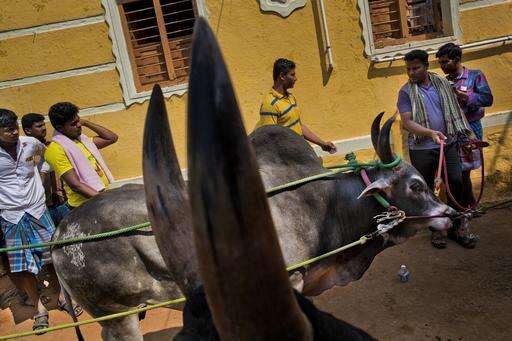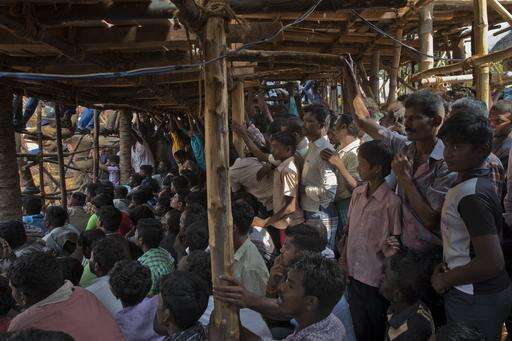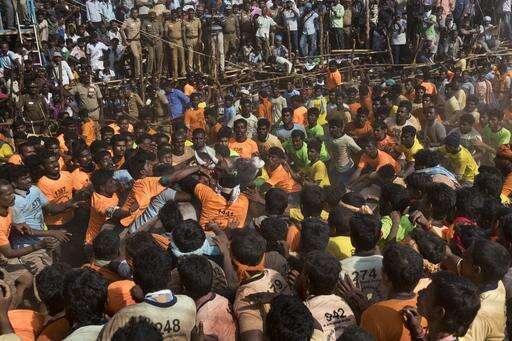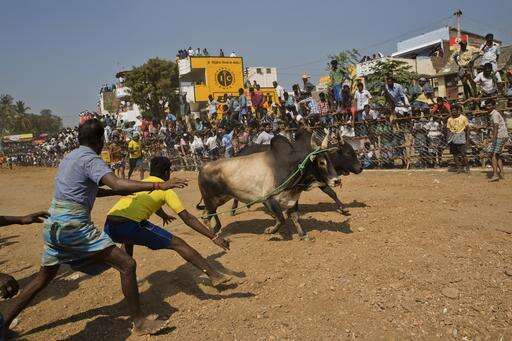In this Feb. 10, 2017 photo, a bull faces a crowd during a traditional bull-taming festival called Jallikattu, in the village of Allanganallur, near Madurai, Tamil Nadu state, India. For animal rights activists, who petitioned Indian courts to have it banned, Jallikattu is incredibly cruel to the bulls. The say the animals have chili powder rubbed into their eyes and have their tails broken as tamers try and ride them. The locals say the claims of animal cruelty are exaggerated and the bulls that run in the Jallikattu ritual actually have a better life than the bulls that spend their lives working on the land. (AP Photo/Bernat Armangue)
The Associated Press
ALLANGANALLUR, India (AP) - In the darkness just before dawn, the southern Indian town buzzed with excitement and energy as revelers began arriving for the spectacle of Jallikattu, the region's version of running with the bulls.
The deeply held religious ritual had been banned in Tamil Nadu for two years after India's Supreme Court found it cruel. Jallikattu returned to Tamil Nadu in January after tens of thousands of people protested for weeks and forced the government to rush new legislation exempting it from animal cruelty laws.
And so the revelry returned to Alanganallur village in Madurai district, one of the main areas steeped in the tradition.
The spectators began arriving at the main arena, along with all the elements that create a carnival in small-town India - the tiny stalls selling hot tea and coffee, cold drinks and fried snacks. Policemen with sniffer dogs secured the venue. Then the trucks with the bulls arrived.
First bulls from the local temples are worshipped and decorated with flowers. They gently amble through the crowds and no one is allowed to tame them.
Then the serious bull-running begins.
By the end of the day, hundreds of bulls were let loose through the wildly excited crowds, with people trying to grab the bull by its hump and hang on to the terrified, bucking animal for at least a hundred meters.
One by one the bulls are led from a pen to a corridor into the packed arena. The bull runs into the crowds as spectators cheer and commentary is broadcast.
Some bull runs are clean, others more chaotic like when a bull ran back to the pen, surprising its trainers who had to hop onto a fence.
Some bulls run fast, others defy the tamers and try to gore. The adrenaline rises and tamers argue after a failed catch or a scuffle.
If the tamers can control the angry, panicking animal they win. If a bull can't be tamed, the prize, everything from pots and pans to flat-screen TVs and even small cars, goes to its owner.
For 18-year-old Santosh, who goes by one name, Friday was a lucky day. Of the six bulls his family brought to the Jallikattu event at Allanganallur, at least five weren't controlled by a tamer. Now the family gets to go home with five gold coins, 5,000 rupees ($75) and sundry household items.
The bulls that his family trains through the year are fed a special diet and don't have to work the land.
Trainers like Santosh see the bulls they train as special animals, part of a sacred ritual that symbolizes Tamil culture and a centuries-old religious ritual performed during the four-day "Pongal," or winter harvest festival.
Animal rights activists petitioned the courts for a ban because they say bulls brought to Jallikattu have chili powder rubbed into their eyes and have their tails broken as tamers try and ride them. Locals say the animal cruelty claims are exaggerated and bulls in the Jallikattu ritual have a better life than bulls used to work the land.
When a much-loved prize bull dies, it's mourned and given a proper funeral. A temple bull is buried within the temple compound.
What it finally comes down to is how strongly the ritual is etched in the psyche of the Tamil.
For tamer Arun Kumar, the return of the tradition is an emotional moment. "Catching a bull is one of the top moments for me. It's a sign of pride for me and my family."
In this Feb. 10, 2017 photo, a bull runs into the arena during a traditional bull-taming festival called Jallikattu, in the village of Allanganallur, near Madurai, Tamil Nadu state, India. If the tamers can control the animal they win. If a bull can't be tamed the prize, everything from pots and pans to flat-screen TVs and even small cars, goes to its owner. (AP Photo/Bernat Armangue)
The Associated Press
In this Feb. 9, 2017 photo, Indian crowd attend a traditional bull-taming festival called Jallikattu, in the village of Palamedu, near Madurai, Tamil Nadu state, India. For two years Jallikattu, a deeply-held religious ritual, had been banned in Tamil Nadu on orders of India's Supreme Court. The tradition, the court said inflicted cruelty upon the animals. (AP Photo/Bernat Armangue)
The Associated Press
In this Feb. 10, 2017 photo, a tamer tries to control a bull during the Jallikattu festival, in the village of Allanganallur, near Madurai, Tamil Nadu state, India. One by one the bulls are led to a small shack at one end of the packed arena and the back door is shut. The bull runs out into the crowds as spectators cheer loudly and commentary on the bull run plays loudly over a microphone. (AP Photo/Bernat Armangue)
The Associated Press
In this Feb. 10, 2017 photo, a Jallikattu supporter attends the traditional bull-taming festival in the village of Allanganallur, near Madurai, Tamil Nadu state, India. In January, tens of thousands of people sat in peaceful protest on Marina beach in Chennai, the state capital of Tamil Nadu demanding that the event be allowed. Across the state, tens of thousands of others, including leading movie stars and sports people, joined the protest. (AP Photo/Bernat Armangue)
The Associated Press

In this Feb. 10, 2017 photo, bulls wait for a vet inspection during the traditional bull-taming festival in the village of Allanganallur, near Madurai, Tamil Nadu state, India. For two years Jallikattu, a bull-taming tradition had been banned in Tamil Nadu on orders of India's Supreme Court. The tradition, the court said, inflicted cruelty upon the animals. This year, Jallikattu returned to Tamil Nadu late January after protesters forced the government to rush new legislation exempting it from animal cruelty laws. And so the revelry returned to Alanganallur village in Madurai district, one of the main areas where the tradition plays out. (AP Photo/Bernat Armangue)
The Associated Press

In this Feb. 9, 2017 photo, Indians attend a traditional bull-taming festival called Jallikattu, in the village of Palamedu, near Madurai, Tamil Nadu state, India. This year, Jallikattu returned to Tamil Nadu late January after protesters forced the government to rush new legislation exempting it from animal cruelty laws. (AP Photo/Bernat Armangue)
The Associated Press
In this Feb. 9, 2017 photo, revelers run away from a bull, not seen, during a traditional bull-taming festival called Jallikattu, in the village of Palamedu, near Madurai, Tamil Nadu state, India. This year, Jallikattu returned to Tamil Nadu late January after protesters forced the government to rush new legislation exempting it from animal cruelty laws. (AP Photo/Bernat Armangue)
The Associated Press
In this Feb. 9, 2017 photo, a bull tries to run from Indian tamers and revelers bull during a traditional bull-taming festival called Jallikattu, in the village of Palamedu, near Madurai, Tamil Nadu state, India. For two years Jallikattu, a deeply-held religious ritual, had been banned in Tamil Nadu on orders of India's Supreme Court. The tradition, the court said inflicted cruelty upon the animals. (AP Photo/Bernat Armangue)
The Associated Press

In this Feb. 9, 2017 photo, tamers try to control a bull runs during a traditional bull-taming festival called Jallikattu, in the village of Palademu, near Madurai, Tamil Nadu state, India. One by one the bulls are led from a pen to a small corridor leading into the packed arena and the back door is shut. The bull runs out into the crowds as spectators cheer loudly and a commentary on the bull run plays loudly over a microphone. If the tamers can control the angry, panicking animal they win. If a bull can't be tamed the prize, everything from pots and pans to flat-screen TVs and even small cars, goes to its owner. (AP Photo/Bernat Armangue)
The Associated Press

In this Feb. 9, 2017 photo, bulls ran through the arena during a traditional bull-taming festival called Jallikattu, in the village of Palademu, near Madurai, Tamil Nadu state, India. For two years Jallikattu, a bull-taming tradition had been banned in Tamil Nadu on orders of India's Supreme Court. (AP Photo/Bernat Armangue)
The Associated Press
In this Feb. 9, 2017 photo, tamers try to control a bull runs during a traditional bull-taming festival called Jallikattu, in the village of Palademu, near Madurai, Tamil Nadu state, India. (AP Photo/Bernat Armangue)
The Associated Press
In this Feb. 9, 2017 photo, Indians attend a traditional bull-taming festival called Jallikattu, in the village of Palamedu, near Madurai, Tamil Nadu state, India. For two years Jallikattu, a deeply-held religious ritual, had been banned in Tamil Nadu on orders of India's Supreme Court. The tradition, the court said inflicted cruelty upon the animals. (AP Photo/Bernat Armangue)
The Associated Press
In this Feb. 10, 2017 photo, Jallikattu supporters take snapshots near a sculpture dedicate to the traditional bull-taming festival, near Madurai, Tamil Nadu state, India. (AP Photo/Bernat Armangue)
The Associated Press
In this Feb. 9, 2017 photo, a bull faces a crowd during a traditional bull-taming festival called Jallikattu, in the village of Palamedu, near Madurai, Tamil Nadu state, India. For two years Jallikattu, a deeply-held religious ritual, had been banned in Tamil Nadu on orders of India's Supreme Court. The tradition, the court said inflicted cruelty upon the animals. (AP Photo/Bernat Armangue)
The Associated Press
In this Feb. 10, 2017 photo, tamers try to control a bull runs during a traditional bull-taming festival called Jallikattu, in the village of Allanganallur, near Madurai, Tamil Nadu state, India. If the tamers can control the animal they win. If a bull can't be tamed the prize, everything from pots and pans to flat-screen TVs and even small cars, goes to its owner. (AP Photo/Bernat Armangue)
The Associated Press